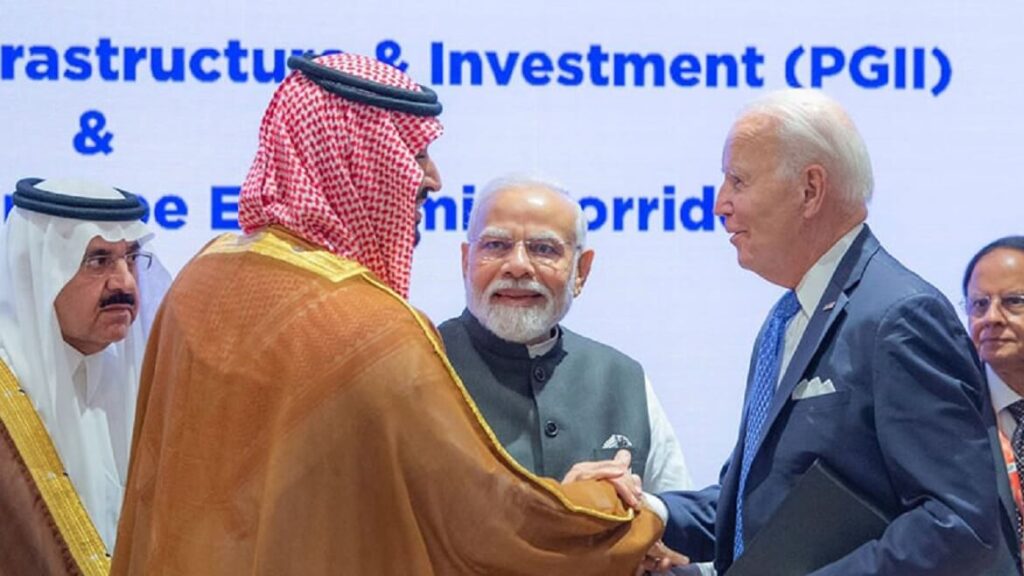By Naseem Sabzal
“Whoever rules the waves rules the world.” These are the famous words of great American naval strategist Alfred Thayer Mahan. Mahan recognized the significance of maritime routes, particularly in light of the increasing colonisation and resource avarice of the dominant powers.

China’s Belt and Road Initiative (BRI) has transformed Mahan’s perspective by paving the way for its cheap goods and raw materials to reach global markets. To protect its trade routes and keep oceans open for all possible circumstances, China has built Artificial Islands in the South China Sea.
But the International system depends on game of action and reaction. IMEC (India-Middle East-Europe Economic Corridor) announced in September 2023 is a US led massive project to counter BRI and China’s influence in the Indian Ocean and It has drawn the attention of world due to its similarities with BRI. IMEC is backed by the USA, Saudi Arabia, UAE, India, EU and Japan the major economic powers and mostly democratic countries while BRI is initiated and financed by mostly China and a bit of investment on local projects is also made by other partners. India is the significant partner of IMEC in South Asia and it is only connected by sea route which passes through Arabian Sea.
India’s connectivity with IMEC has many geo-economic and strategic complexities because it has only one route to connect with other IMEC members which passes very close to Gwadar port and CPEC which is the flagship project of BRI in Pakistan. Pakistan sits on the pinpoint in the Arabian Sea and its strategic location in the region gives it very swift access to the Middle East, Africa and Europe through the Red Sea. It also allows Pakistan to keep check on navigation of ships, vessels and logistics in the Arabian Sea.
India and IMEC need to overcome many security challenges due to its complex location. Since the project was announced, the Gaza crisis emerged on October 7th which raised concerns and questioned the security of IMEC. Israel is also part of this project which gives access to Europe through the Mediterranean Sea from its Haifa Port. Israel’s war on Gaza was a reality check for IMEC and its security. It has suspended the practical implications of this project unless routes are protected to pass ships. India’s access to IMEC has also geostrategic challenges because it passes very close to BRI routes and Gwadar port in the Arabian Sea which pulls the attention of its traditional rivals China and Pakistan.
As IMEC is introduced to counter China and its growing Influence in the Indian Ocean, India has already joined the US lead pacts I2U2, PGII (Partnership for Global Infrastructure and Investment), the QUAD to surround China and limit its influence in South China Sea. Yet India is far behind to counter BRI because of resource arrangements and practical implication of these projects. But China’s strategy to build artificial islands or influence existing islands in the South China Sea to protect its maritime routes and keep oceans open for all circumstances has given its rivals a point to have dominance in the oceans. It becomes very interesting how India protects its trade routes in the Arabian Sea despite having hostile relations with its neighbours Pakistan and China. Any adventure from India considering the security of IMEC in the Indian Ocean will have significant consequences on the regional balance of South Asia.
India being a key player of Counter BRI project IMEC, is yet to announce how it secures its maritime routes and investments. It is early to conclude how India plays its card by diplomatically engaging its neighbours or strategically countering the rivals by inviting other IMEC members especially the US which will disturb the regional balance. While assessing the cost of IMEC, any measure to bypass Pakistan will put IMEC in complication economically and strategically. Pakistan’s geo-economic cards are very crucial for its vital security and economic interests. It is a quite tricky situation for India how it deals with Pakistan analysing the current hostile circumstances. The success of IMEC may not completely depend on Pakistan but it also cannot totally turn blind eye on Pakistan for its success.
Author: Naseem Sabzal – Research Assistant at Balochistan Think Tank Network (BTTN) Quetta.
(The opinions expressed in this article are solely those of the author and do not necessarily reflect the views of World Geostrategic Insights).







